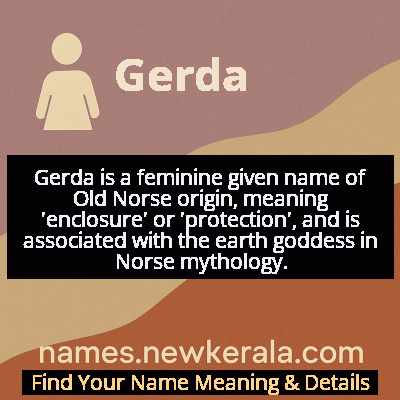Gerda Name Meaning & Details
Origin, Popularity, Numerology Analysis & Name Meaning of Gerda
Discover the origin, meaning, and cultural significance of the name GERDA. Delve into its historical roots and explore the lasting impact it has had on communities and traditions.
Name
Gerda
Gender
Female
Origin
German
Lucky Number
8
Meaning of the Name - Gerda
Gerda is a feminine given name of Old Norse origin, meaning 'enclosure' or 'protection', and is associated with the earth goddess in Norse mythology.
Gerda - Complete Numerology Analysis
Your Numerology Number
Based on Pythagorean Numerology System
Ruling Planet
Saturn
Positive Nature
Ambitious, efficient, realistic, and authoritative.
Negative Traits
Materialistic, stressed, confrontational, and can be overly ambitious.
Lucky Colours
Dark blue, black.
Lucky Days
Saturday.
Lucky Stones
Blue sapphire, amethyst.
Harmony Numbers
2, 4, 6.
Best Suited Professions
Business leaders, managers, financial services, law enforcement.
What People Like About You
Leadership, determination, organizational skills.
Famous People Named Gerda
Gerda Weissmann Klein
Holocaust survivor and author
Award-winning writer and human rights activist who documented her Holocaust experiences
Gerda Lerner
Historian and author
Pioneer in women's history and founder of the first graduate program in women's history in the United States
Gerda Taro
War photographer
First female photojournalist to die while covering the front lines in the Spanish Civil War
Gerda Steinhoff
SS guard
Notorious for her role as an SS guard at Nazi concentration camps, executed for war crimes
Name Variations & International Equivalents
Click on blue names to explore their detailed meanings. Gray names with will be available soon.
Cultural & Historical Significance
During the Nazi era, the name saw some decline due to its 'old-fashioned' connotations, but it experienced a minor revival in post-war Germany as people sought to reconnect with traditional cultural roots. The name carries with it centuries of European history and mythological significance, representing both physical protection and emotional sanctuary in various cultural contexts. The enduring popularity of Hans Christian Andersen's fairy tale 'The Snow Queen,' featuring the brave protagonist Gerda, has further cemented the name's place in Western cultural consciousness.
Extended Personality Analysis
Women named Gerda are often perceived as strong, resilient, and protective individuals who value stability and security. They tend to be practical problem-solvers with a nurturing instinct, often taking on protective roles within their families and communities. Their strength is typically quiet and steady rather than flashy, making them reliable anchors in times of crisis.
Gerdas are frequently described as having deep emotional intelligence and a strong sense of responsibility toward those they care about. They often exhibit a blend of traditional values and independent thinking, creating a unique balance between convention and personal authenticity. Many Gerdas develop strong organizational skills and show remarkable perseverance when facing challenges, drawing on an inner reservoir of strength that others might not immediately recognize. Their protective nature extends beyond physical safety to emotional support, often making them trusted confidantes and advisors who create safe spaces for others to grow and heal.
Modern Usage & Popularity
In contemporary times, Gerda has become a relatively uncommon but culturally significant name, particularly in Germany and Scandinavian countries where it maintains traditional appeal. The name experienced peak popularity in the early 1900s but declined significantly after World War II. However, recent years have seen a modest revival as part of the 'vintage name' trend, with parents seeking unique names with historical depth. In Germany, it ranks outside the top 500 names but maintains steady usage among families valuing traditional Germanic names. Internationally, the name appears occasionally in immigrant communities and among families with German or Scandinavian heritage. The character of Gerda in Hans Christian Andersen's 'The Snow Queen' continues to introduce the name to new generations, and the 2013 Disney film 'Frozen' (loosely based on the same story) has sparked renewed interest in the original fairy tale character, potentially influencing naming choices among literature enthusiasts.
Symbolic & Spiritual Meanings
Symbolically, Gerda represents protection, sanctuary, and emotional fortitude. The name's etymological roots in 'enclosure' or 'fortress' translate metaphorically to creating safe spaces—both physically and emotionally. It symbolizes the strength found in nurturing and protecting others, much like the mythological Gerðr who was associated with the earth's fertility and protection. The name carries connotations of resilience and endurance, reflecting the ability to withstand challenges while maintaining one's core values. In a broader sense, Gerda symbolizes the intersection of strength and compassion—the ability to be both a protector and a nurturer. The name also represents connection to nature and tradition, hearkening back to ancient Germanic roots while maintaining relevance in modern contexts. It embodies the idea that true strength often manifests as quiet determination rather than overt power, and that protection can be both a physical safeguard and an emotional sanctuary.

